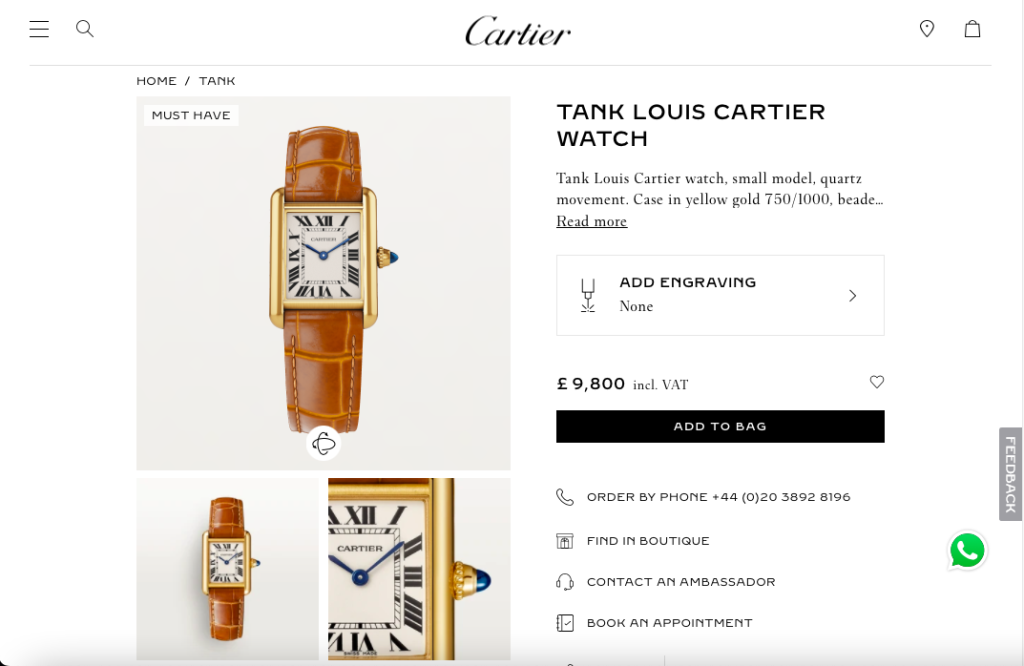Our websites use cookies. By continuing, we assume your permission to deploy cookies as detailed in our Privacy Policy.
Custom Couture: High-End Lessons in Marketing Personalisation from Luxury Brands
Welcome to Marketing Personalisation 201: Lessons from Luxury Brands!
But why are we looking to luxury for lessons in marketing personalisation? Because for these high-end brands, personalisation isn’t an afterthought; it’s the very foundation of their existence.
And lucky for us, their secrets aren’t locked away in gilded vaults.
In this crash course, we’ll explore how luxury brands weave personalisation into the fabric of their customer experience, creating connections that go beyond just a sale.
Get ready to take notes—these high-end lessons will have your customers feeling like royalty, without the royal price tag!
What is Personalised Marketing?
Personalised marketing has come a long way from adding “Dear [First Name]” to an email campaign and calling it a day.
Nowadays, personalised marketing refers to the shift from the one-size-fits-all approach of the past to a strategy that acknowledges each customer’s unique needs, preferences, and behaviours. This said shift has been driven by technology and a fundamental change in consumer expectations.
Customers want to be seen, not just sold to.
And now, with access to simple yet sophisticated data collection methods, brands get to gain insights into customer preferences, which, in turn, help tailor all marketing communications. Think targeted social media ads, personalised emails, or product recommendations based on past purchases.
Luxury brands have long been the masters of personalisation. From remembering a client’s preferred beverage to crafting bespoke experiences, everything is done to make each customer feel special.
Cause in luxury marketing, personalisation isn’t just a strategy; it’s an experience.
An Overview of Luxury Brands’ Expertise in Personalisation
Luxury brands have mastered the art of personalisation, elevating it beyond mere marketing tactics.
These brands understand that personalisation isn’t just about offering choices. It’s about exceeding expectations by anticipating desires and crafting experiences that feel intimate and special.
This focus on detail and human connection allows them to build lasting relationships with their customers, solidifying their position in the hearts (and wardrobes) of luxury aficionados.
Here’s a glimpse into their playbook:
The Art of Bespoke
Think bespoke tailoring from brands like Armani, where you choose every detail from fabric to buttons, or Hermès’ Birkin “program”, where obtaining your dream bag can take years.
This level of personalisation imbues the product with a special significance, a one-of-a-kind treasure that reflects your individuality.
Exclusive Experiences
Luxury stores are more than just retail spaces; they’re personalised havens. Think private shopping consultations where a knowledgeable salesperson guides you through a curated selection based on your preferences.
Tiffany & Co., for example, offers engraving services to personalise your jewellery, adding a sentimental touch beyond the physical object.

Heritage and Craftsmanship
Luxury brands leverage their rich history and meticulous craftsmanship to create personalised experiences.
Imagine receiving a handwritten note from a jeweller like Tiffany & Co. detailing the provenance of the gemstone chosen for your custom necklace. This attention to detail and appreciation for heritage adds an emotional layer to personalisation, making it truly special.
The Power of Exclusivity in Luxury Marketing
The desire for something rare and unobtainable is deeply ingrained in human psychology. We often value things more because they are not readily available to everyone. This fuels the allure of luxury brands, creating an association with prestige, success, and a sense of belonging.
So, how do luxury brands maintain this air of exclusivity? Let’s take a look at some of the luxury marketing strategies that create this sense of mystique:
- Limited editions: These coveted items, produced in small batches, create a sense of urgency and scarcity. Think limited-edition handbag collections with unique designs or collaborations with renowned artists. Owning one becomes a badge of honour, signifying you were part of a select group who snagged this exclusive offering.
- Invitation-only events: Exclusive events with limited guest lists fuel the desire to be “in the know”. Imagine receiving a personalised invitation to a VIP gathering, complete with bespoke cocktails and the opportunity to mingle with industry icons. This exclusivity fosters a sense of belonging to an elite inner circle.
- Exclusive memberships: Many luxury brands offer membership programs with tiered benefits. The higher the tier, the more exclusive the perks. These might include access to personalised consultations, early product releases, or even private shopping experiences.
Luxury brands masterfully walk the tightrope between personalisation and exclusivity. They personalise experiences without sacrificing the aura of being part of a privileged few. This creates a powerful emotional connection with customers, fostering brand loyalty that transcends mere transactions.
At its core, luxury marketing is about belonging and being seen and valued as an individual within a discerning group.
5 Personalisation Lessons from Luxury Marketing for Other Industries
Luxury brands aren’t just masters of indulgence; they’re experts in building lasting customer relationships. Here are five key lessons you can adapt for your own business, regardless of industry:
1. Anticipate Needs with Data
Luxury brands excel at anticipating customer desires, ensuring their services are received at just the right time—never too late nor early.
Because they know their customers personally, these brands know their customers’ shopping habits and frequencies and understand their preferences.
For non-luxury brands, this translates to utilising customer relationship management (CRM) systems and real-time website analytics. Analyse purchase history and browsing behaviour to recommend relevant products or services.
Think of a travel company recommending personalised vacation packages based on previous trips or a music streaming service creating curated playlists based on listening habits.
2. Craft Memorable Moments
Luxury experiences go beyond the product itself. Imagine receiving a handwritten birthday card with a special discount or a surprise upgrade on your flight.
Non-luxury brands can create memorable moments through personalised birthday emails with exclusive offers or loyalty program rewards that unlock unique experiences.
Think about how you can inject a touch of surprise and delight into your customer interactions. For example, a fitness centre could offer a complimentary personal training session for a member’s birthday, or a restaurant could offer a personalised anniversary dessert for the occasion.
3. Leverage User-Generated Content (UGC) and Social Proof
Luxury brands often leverage the power of celebrity endorsements. Take inspiration from this form of social proof marketing by encouraging user-generated content.
Non-luxury brands can leverage UGC by incorporating customer reviews, photos, or testimonials into their website, social media or newsletters.
Run contests encouraging customers to share photos or videos using your products or services. Not only does this create a sense of community, but it also provides valuable insights into how customers perceive your brand.
4. Prioritise a Seamless Customer Journey
Luxury service is all about anticipating and fulfilling customer needs.
For non-luxury brands, this translates to offering a smooth and consistent experience across all channels. Ensure a user-friendly website, responsive customer service, and a streamlined checkout process. Invest in omnichannel marketing, delivering personalised messages across different platforms based on customer behaviour.
5. Transparency, Transparency, Transparency
It is of no matter whether you are a luxury brand or not. Prioritising transparency in data collection is a necessity for all businesses. These principles apply to all:
- Be upfront about the data you collect and how it’s used.
- Clearly explain the value exchange and how personalisation benefits the customer.
- Offer clear opt-out options and prioritise data security.
What Luxury Brands Can Teach Us About Marketing Personalisation
Luxury brands have revolutionised personalisation, weaving it seamlessly into the very fabric of their customer experience. They’ve consistently demonstrated that personalisation isn’t just about offering discounts; it’s about creating meaningful connections and exceeding customer expectations.
While challenges like data privacy and implementation costs exist, transparency and focusing on the customer’s benefit can help navigate them. Embrace personalisation not just as a marketing tool but as a way to build genuine connections and cultivate brand loyalty that endures.
Start your personalisation journey today and craft a unique experience that sets you apart in the ever-evolving marketing landscape!





